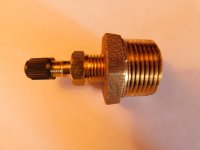My cabin took a big hit when the elec failed during extended sub zero temps. heat lamp under sink works great when there's power, but i lost a tankless water heater & pipes in the aftermath w/o power for many hrs. The supply from the pump house is below cabin, so a purge in extremes would be good.
what is your method of using compressed air to purge lines?
& for those familiar w/elec tankless heaters, w/circuit off, is there any problem with using compressed air to purge the tank through the lines? (& i'm careful to fill tank completely before use again)
what is your method of using compressed air to purge lines?
& for those familiar w/elec tankless heaters, w/circuit off, is there any problem with using compressed air to purge the tank through the lines? (& i'm careful to fill tank completely before use again)
Last edited:
